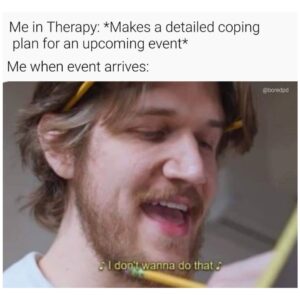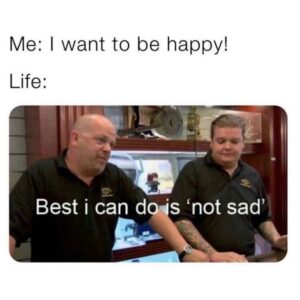Have you ever been driving and randomly thought about yeeting your car off the road? Maybe you’ve thought about squeezing your pet just a little too hard? Or you had a weird urge to strip naked and run through a busy mall? If you’re internally screaming YES, just know that you’re not alone. These are called intrusive thoughts, and they’re pretty common. We’re going to dive into how they work, what they mean, and how to stop intrusive thoughts!
What Are Intrusive Thoughts?
Intrusive thoughts can be SUPER uncomfortable and disturbing at times, but it’s important to remember that they don’t define who you are. These thoughts are entirely harmless and you shouldn’t feel bad about having them.
Intrusive thoughts are intense, can’t be challenged with logic and often come out of nowhere. They can actually be sooo wildly disproportionate from who you are as a person that you get scared (because you don’t want to act on what’s playing out in your head). The thoughts tend to stick in your brain and the more you try to push them away, the more they will come back over and over and over again! WTF, right?!
“Intrusive thoughts are thoughts that come into our consciousness that are distressing, scary, and/or shameful,” says psychotherapist Nadia Adessi in a recent episode of the Anxious Like You podcast. “We try really hard to push them away, but they seem to stick around and intrude, and can cause us to feel shame and fear. We never want them, and we never like them.”
To add to it all, these shameful thoughts come with loads of anxiety! They can completely shove logic aside and make you afraid that others are able to read your mind. THEY CAN’T. But, you still feel like you need to hide what’s going on inside your head when, really, it’s a fairly common experience. Now, let’s get to the root of these thoughts!
What Causes Intrusive Thoughts?
Some intrusive thoughts can be situational. For example, if you’re holding a knife you might picture cutting someone with it. Scary, right? But still, totally normal. These situational thoughts tend to be more common in people who have experienced trauma. So someone with Post-Traumatic Stress Disorder (PTSD), Complex Post-Traumatic Stress Disorder (CPTSD), Obsessive-Compulsive Disorder (OCD), an eating disorder, or several other conditions is more likely to develop these thoughts when they’re in a state of hyperarousal — whether they’re anxious, depressed, or in fight-flight-freeze mode.
“A lot of [intrusive thoughts] are coming from us being in an environment and coming up with things subconsciously in our mind that can be harmful or scary to us,” adds Nadia. “Sometimes, it’s just our mind’s way of trying to protect ourselves in those situations because we are scanning for things that we would deem as dangerous or immoral or uncomfortable.”
You could be in a situation where you have too much control or you could be in one where you have too little control, and these thoughts will serve as your body’s very inconvenient defense mechanism. Everyone will struggle with fleeting intrusive thoughts at one point or another, but some others will experience them much more frequently (it just depends on the person).
What Can Intrusive Thoughts Look Like?
Here are some common examples of how these unwanted urges present themselves:
– Harm: You might think about driving your car off a bridge or throwing a pet out the window. It can be like playing out a Final Destination scene in your head (for just a split second).
– Embarrassment: Like wanting to stand in the middle of a busy mall and scream obscenities.
– Relationships: Thinking that you don’t actually love your partner.
– Sexual: Thinking about an inappropriate person, like a family member or a child.
Intrusive thoughts can also take on many other forms and patterns.
Those with OCD may notice their intrusive thoughts become more repetitive, or cause them to feel like something bad will happen if they don’t pursue said thought. People who struggle with eating disorders may experience body-focused thoughts, like they are being judged for something they are eating. Women experiencing postpartum depression may also have intrusive thoughts, specifically related to harming their baby.
What Do Intrusive Thoughts Mean?
No matter which way they manifest themselves, intrusive thoughts mean absolutely nothing — because they are ultimately just thoughts. That doesn’t mean they can’t feel completely debilitating when they happen, but it does mean you don’t need to worry about going to jail just because the thought of hurting someone crossed your mind.
There are two big misconceptions surrounding intrusive thoughts:
1. People want to act on these thoughts.
2. All thoughts are worth examining.
No, people do not want to act on all of their thoughts. And no, thoughts do not always carry significant meaning. The key thing to remember is that an intrusive thought is something that happens to you, not something that defines you!
You Are Not Alone
You might feel ashamed of the intrusive thoughts you are having, and like you should keep them a secret, but know that there are sooooo many people in the same boat! In fact, the Anxiety and Depression Association of America (ADAA) reports that approximately 6 million Americans regularly experience intrusive thoughts. 6 MILLION!!! (And that’s only including people who have shared their concerns with a doctor.)
“Every single person gets intrusive thoughts and they do not say anything about your character. They do not mean that anything is wrong with you, that you should feel shame, that you should feel like you’re a bad person…” explains Nadia. “They are normal. They are happening to everybody.”
And the AMAZING news? These thoughts won’t rattle around in your head forever because there are steps you can take to (hopefully) send them on their merry way! Let’s go over how to stop intrusive thoughts in their tracks.
How to Stop Intrusive Thoughts
As normal and harmless as intrusive thoughts are, they’re still suuuper uncomfortable and can cause a real upheaval in your brain. So, if you are looking for some ways to calm your thoughts, you have a few options!
In the moment, your best bet is to self-soothe and avoid trains of thought that can make the situation worse. There are a few things you can tell yourself to remind your brain it doesn’t need to be anxious. But, if intrusive thoughts start to impact how you go about your days, a mental health specialist can help in recommending treatment or medication.
1. Remind Yourself Who Is in Control
The first thing you should do is remember that thoughts are automatic and that you do not control them — nor do they control you. But you CAN control your actions. You’re bigger than what is going on in your head. You own the thought. You call the shots.
“Those thoughts cannot do anything to you,” explains psychotherapist Micheline Maalouf. “You, at the end of the day, decide. And if it’s not who you are, then you’re not going to do them. So, don’t let them scare you because they cannot hurt you.”
2. Ground Yourself
Start grounding yourself by bringing your attention back to your surroundings. Actively label the thought as “intrusive.” Don’t let it consume your mind and instead allow yourself to sit in the anxiety as you slowly bring your attention away from the thought. Then, try your best to return to the activity you were doing before the intrusive thought popped into your head.
3. Out of Sight, Out of Mind
A tactic that Nadia and Micheline suggest is putting the unwanted thought in an imaginary cloud and envisioning that cloud passing by you. It will disappear as quickly as it appeared. While the thought is ‘out of sight and out of mind,’ you’ve still acknowledged that you had it and didn’t allow yourself to act on it.
4. Use Affirmations
Think of your intrusive thoughts as Thing 1 and Thing 2: the chaos and craziness locked up in the big red box that is your brain. But the more you try to control Thing 1 and Thing 2, the more out of control they get.
So, here are some affirmations you can use to calm your intrusive thoughts. Say these with us:
Acknowledging a thought is not accepting a thought.
At this moment, I choose to let this thought pass.
Just because it is my thought, does not mean it’s true.
My thoughts have power over me only if I give them power.
I can observe my thoughts without attaching meaning to them.
Struggling is a human experience. It is okay to feel what I’m feeling.
I am proud of my efforts to deal with my thoughts.
5. Don’t Entertain It
Intrusive thoughts (a.k.a. Thing 1 and Thing 2) are NOT guests you want to invite over for a cup of tea. Don’t make them feel welcome and def don’t let them spend the night.
That said, here are some things to avoid when having an intrusive thought:
– Engaging with the thought.
– Trying to figure out what the thought “means.”
– Suppressing the thought.
– Allowing the thought to make you doubt your character.
In the thick of an intrusive thought, these approaches can be difficult to apply. But if practiced regularly they can be very effective. If your intrusive thoughts become severe and unbearable, we recommend speaking to a mental health specialist.
To find out more about how to stop intrusive thoughts, tune in to the “Talking Intrusive Thoughts” episode of our Anxious Like You podcast!


























